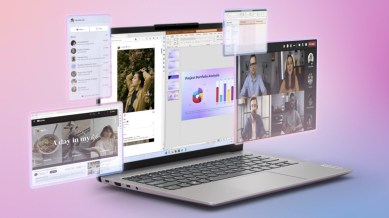Anuj Bhatia is a personal technology writer at indianexpress.com who has been covering smartphones, personal computers, gaming, apps, and lifestyle tech actively since 2011. He specialises in writing longer-form feature articles and explainers on trending tech topics. His unique interests encompass delving into vintage tech, retro gaming and composing in-depth narratives on the intersection of history, technology, and popular culture. He covers major international tech conferences and product launches from the world's biggest and most valuable tech brands including Apple, Google and others. At the same time, he also extensively covers indie, home-grown tech startups. Prior to joining The Indian Express in late 2016, he served as a senior tech writer at My Mobile magazine and previously held roles as a reviewer and tech writer at Gizbot. Anuj holds a postgraduate degree from Banaras Hindu University. You can find Anuj on Linkedin. Email: anuj.bhatia@indianexpress.com ... Read More
Lenovo bullish on AI in consumer PC space, won’t charge consumers for on-device AI features
Companies like Lenovo are eager to sell PCs with native AI to consumers and workers who bought during the height of the pandemic and are now looking to replace them with AI-equipped PCs.

Lenovo is prioritising Artificial Intelligence as a de-facto element in its roadmap to attract new consumers, as PC companies race to embed increasingly sophisticated chatbots and assistants across their personal computers.
“In the next two to three years, 70% of the devices will be AI-native. I think there is a huge opportunity in the consumer space, but initially, it will be in the premium space. Then you will see that these AI capabilities will flow into rest of our product roadmap,” Luca Rossi, President and EVP at Intelligent Devices Group (IDG), Lenovo, said during a select media briefing Wednesday in Delhi.
monthly limit of free stories.
with an Express account.
The world’s biggest tech companies are incorporating artificial intelligence models and infusing AI into their products and services. This year, the most significant trend is to integrate advanced AI capabilities into personal computers and smartphones at the core level. Microsoft is already rolling out Copilot on PCs with Windows 10, the world’s most popular operating system, and Windows 11. Copilot is a generative artificial intelligence that can create human-like text and other content with just a few words of human direction.
Companies like Lenovo are eager to sell PCs with native AI to consumers and workers who bought during the height of the pandemic and are now looking to replace them with AI-equipped PCs.
“I think in the middle or later part of this year, you’ll start to see, with our silicon and software partners, as well as retail partners, going out and showing the world what you can do with AI,” chimed in Matthew Zielinski, Executive Vice President and President, International Markets, Lenovo. He added that the use cases of AI go beyond what is currently being demonstrated, whether it’s a personal assistant or using AI to edit photos.
“There’s an immense training process there, but it’s the start of a relationship that will continue to evolve. It is profound, and we just have to wait to see how that process of propagating the benefits plays out.”
Big tech’s shift in focus to AI stems from the fact that consumers aren’t excited to see the traditional hardware upgrades that come with new PCs. They may look the same, perhaps with a better screen, CPU, or graphics, but these improvements are not exciting enough to capture consumer attention. Experts and trade pundits see AI as a generational shift that could spur PC sales. In fact, Microsoft is calling 2024 “the year of the AI PC.”
As tech companies go bigger on AI, PC companies, like smartphone brands, will increasingly adopt “on-device AI” or the ability to carry out AI workloads directly on a device, rather than over the cloud. At CES this year, Lenovo announced Yoga laptops with Windows 11 that come with Lenovo Yoga Creator Zone, a text-based image generator, which works even without internet access.
However, Lenovo is also increasingly focusing on adding GenAI features that are exclusive to its own PCs. For example, Lenovo AI Now Personal Assistant uses natural language to let users control and change PC display and performance settings, search emails and documents, and even create meeting invitations. That feature will launch in China in the first half of the year.
“Copilot is one of the many Gen AI solutions, but obviously, it is a dominant one as of today. We will also have certain Gen AI features developed by Lenovo but will launch in China first. We haven’t decided whether or when we will launch those features in global markets,” Rossi said.
Rossi says Lenovo has no plans to charge users for on-device Gen AI features. For now, at least, Lenovo is clear it doesn’t have plans to levy a fee for AI usage. But others are taking a different approach as to how to recoup the ongoing cost to run AI models. Samsung recently went all-in with AI-centric branding with its latest Galaxy S24 smartphones, but the company has already signaled it might charge for some of these AI phone features. Similarly, Amazon is also planning a subscription model for Alexa in the future.